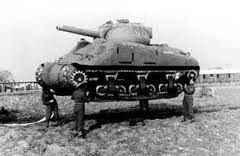 |
| Macintyre's Latest Spy thriller US edition to be released 7/31/12 |
Ben Macintyre has a written his third outstanding account of World War II espionage with Double Cross: The True Story of the D-Day Spies (http:/www.amzn.com/0307888754). 2012. Macintyre's Operation Mincemeat (http:/www.amzn.com/0307453286) concerns the planting of a dead British naval officer on the coast of Spain to deceive the Germans about allied intentions prior to the invasion of Sicily in 1943. His Agent Zig Zag (http:/www.amzn.com/0307353419) tells the fascinating tale of Eddie Chapman -- a safecracker who was a triple agent and became the only Englishman to win an Iron Cross in World War II.
Double Cross is the most substantive work of the three due to the colossal strategic importance of its subject matter -- the Normandy landings (see earlier post, D-day + 68, 6/6/12). The book is full of revelations about the secret history of World War II.
The Abwehr, German intelligence, dispatched numerous agents to Great Britain during the course of the war. Not one or several but rather ALL were rounded up by British intelligence and caught and, in most cases, turned to work for the allies. The British quickly realized that, whenever possible, it would be much better to have these agents feeding disinformation back to their German bosses rather than just have them rotting in prison or worse. They would carefully control their reports and include elements of trivial truth, "chickenfeeed" to maintain their agents' plausibility.
 |
| Juan Pujol (Agent Garbo) |
Macintyre quotes the great Chinese war strategist Sun Tzu, "The enemy must not know where I intend to give battle. For if he does know where I intend to give battle he must prepare in a great many places. And when he prepares in a great many places, those I have to fight in any one place will be few. And when he prepares everywhere he will be weak everywhere." This was the essence of the Allied intelligence strategy in the war. Their goal was to mislead, misdirect and confuse the enemy whenever possible.
 |
| Rubber tanks of FUSAG |
The extent to which this disinformation campaign succeeded is truly remarkable. Even after the June 6, 1944 and the greatest amphibious invasion in all history, Hitler continued to believe that Normandy was just a feint and that the main landings would still come at the Pas de Calais. Panzer divisions that could have been diverted to counterattack the allies precarious beachheads were held in place. On July 29, 1944, The Fuhrer even awarded Pujol (agent Garbo) an iron cross for "your extraordinary merits".
The allies attached such importance to the operation Fortitude deception that Eisenhower and the Allied high command were actually willing to release an accurate account of the direction and intent of the Normandy landings to the Double Cross agents three and 1/2 hours prior to the actual invasion. They did so in order to preserve the credibility of these agents after D-Day, sure in the knowledge that this would be insufficient time for the Germans to take any significant countermeasures. The message was sent out at 3:00am to Germans based in Madrid prior to the landings timed to start at 6:30am. "The only response was a crackle of static...The radio operator had either left his post, or fallen asleep." There was no response until 8:00a when the message was finally picked up and acknowledged. "The Germans had been caught napping."
 |
| Johnny Jebsen |
Hitler led a depraved immoral regime that approached their strategic challenges with supreme arrogance. They made tremendous technological achievement in fields such as rocketry, jet engines and snorkel submarines yet they were hopelessly naive and idiotic in their intelligence services which compromised their efforts throughout the war. The Axis never realized, for example, that their radio traffic was being constantly eavesdropped upon during the war (see earlier post, Bletchley Park and the Judgement of History, 4/22/12). Many Germans who really loved their country (like Jebsen) realized that their country was being run by gangsters and were quite willing to betray the nazis at the first opportunity.
When Jebsen met with an MI-6 counterpart in Lisbon in the closing days of the war he told the following joke that was making the rounds among his German peers: "'During an air raid Hitler, Goering, Goebbels and Himmler took refuge in the same air raid shelter. The shelter received a direct hit. Who was saved? Germany.'"
While superior allied intelligence did not win the war, the efforts of the Double Crossers, the code-breakers of Bletchley Park and others in the intelligence community did shorten the conflict and saved countless lives in the process.
Ultimately, the greatest advantage the Western Allies had over the Axis in World War II was not technological, economic or industrial; it was the moral distinction between the combatants that gave the allies their greatest edge and, in fact, helped create all other advantages that they enjoyed.
Commander Kelly says, "If you like a good spy story, you'll love Ben Macintyre's Double Cross."
You can now purchase Commander Kelly's first book, America Invades here...www.americainvades.com or on Amazon...www.amzn.com/1940598427

1 comment:
Excellent post. Visited the Spy Museum in Washington, D.C. in 2014, and there are many excellent texts sold there and items on display which point to all the items in this post. This looks to be good information.
Post a Comment